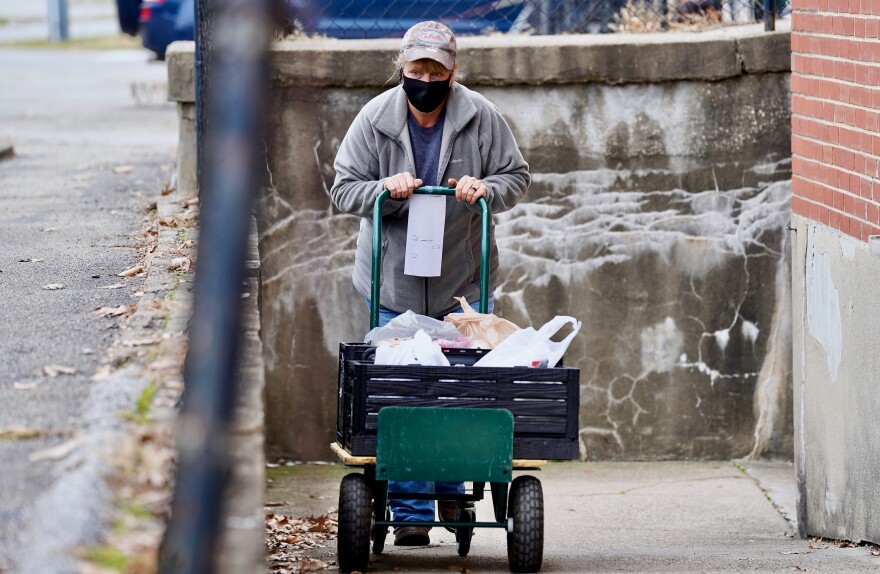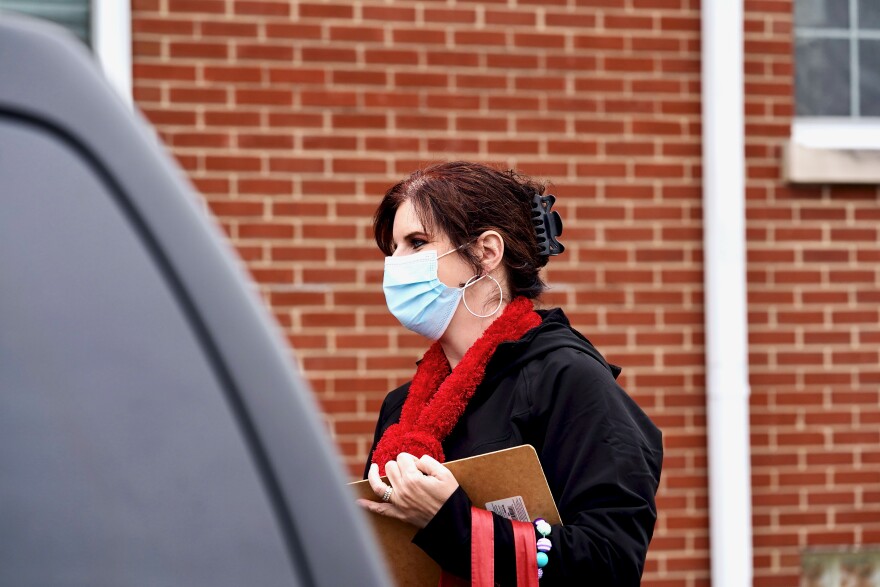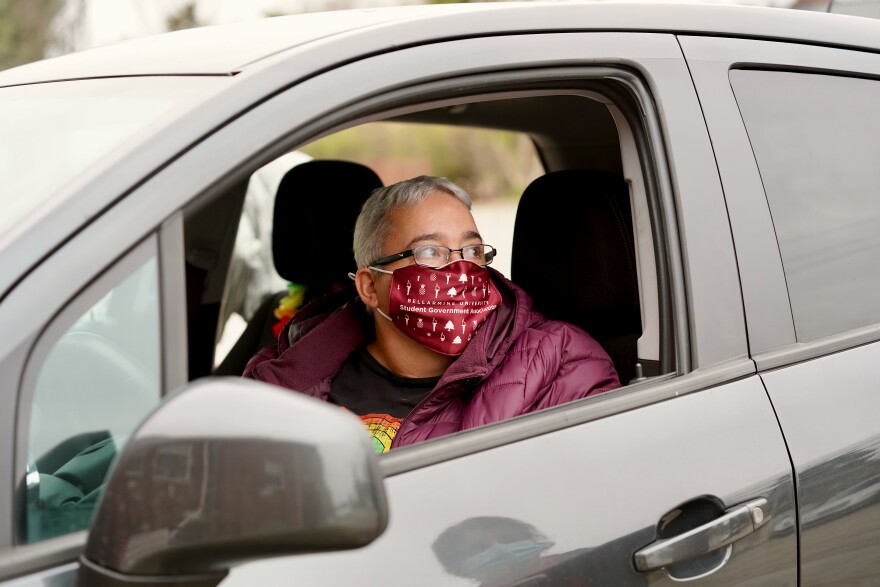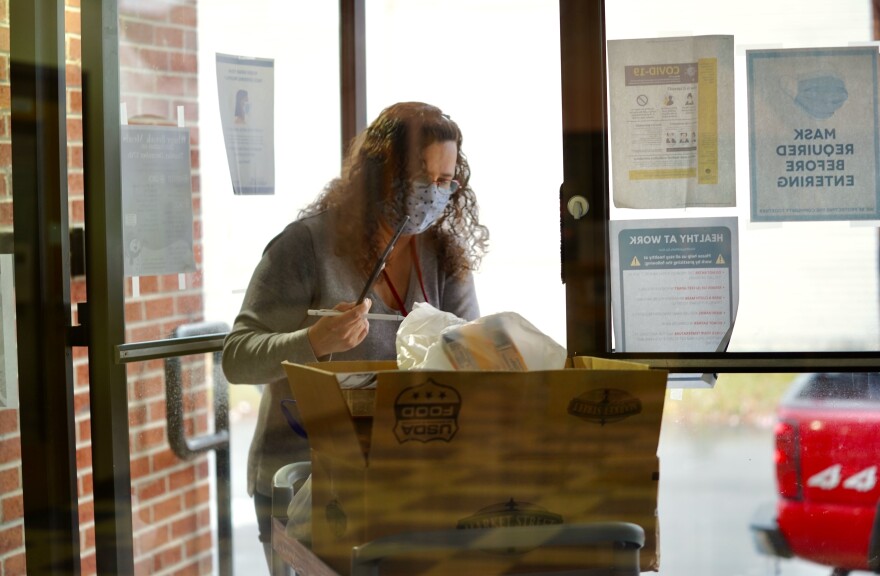89.3 WFPL News Louisville · Essential: Food Pantry Workers See Growing Demand
St. Matthews Area Ministries executive director Julie Abbott said it was a bit of a scramble early in the pandemic to continue their food pantry operation.
They had to pivot to “an all-inclusive drive-thru distribution” model.
“Because we want to make it a one-stop shop to make it streamlined for each family, not use the gas money, which of course is very important right now,” she said.
That “one-stop shop” isn’t just for groceries. The ministry also passes out personal items, school supplies, infant and toddler stuff and whatever else people may need. It also has to be a safe environment for Abbott’s workers and people using their services.
Abbott has seen how bad this virus can be. Her mom had COVID in late March.
“She more or less shouldn't have lived, but she is here today,” Abbott said. “She’s still having a ton of side effects and complications.”
The outdoor distribution isn’t without it’s complications, either.
It puts them at the mercy of weather, and giving out several different kinds of supplies in one pickup requires a lot of person power. Abbott said it’s made the day-to-day more stressful.
“Everything has to be prepared prior to the appointment times,” she said. “And a lot of times partnerships aren't bringing those fresh donations until 45 minutes before we're ready to go… But then if you don't have enough volunteers to help to do that, it makes that challenging.”
Abbott says her volunteer workforce is down by two-thirds just as demand for food at the pantry is up by 100%. And the need was already great pre-pandemic.
According to Feeding America data, a little more than 158,000 people in the 13-county area around Louisville were food insecure before the pandemic disrupted the economy. Now, the national organization is projecting that number will have risen to 203,000 by the end of 2020.
Stan Siegwald, director of strategic initiatives for Dare to Care Food Bank, said that’s worse than what they saw during the Great Recession about a decade ago.
In fact, a Feeding America report that looks at COVID-19’s effect on food insecurity in the U.S. said the current crisis has actually reversed advancements made since the Great Recession.
In March, they saw a 30% increase in demand for food from all 200-plus Dare to Care partners, which includes St. Matthews Area Ministries, Siegwald said — roughly 600,000 more pounds of food.
It’s tapered off in recent months, but it’s still “an outrageous” number, Siegwald said.
Grassroots organizations in Louisville have tried to help meet the rising need too by organizing food drives and meal distributions, especially after Jefferson County Public Schools ran out of the million-plus meals the district prepared to help families stock up for winter break and had to turn away families.
Melissa Hibbs started using St. Matthews Ministries’ services during the pandemic. She’s a graphic designer, and has been getting less work since the pandemic began. That’s made it hard to feed her three kids.
“I just can't make it work,” she said. “So I reached out for help."
And that’s what Julie Abbott wants people to know: that they’re here to help, and no one should be embarrassed to ask for it. But she is concerned how things will take shape in the new year.
“There's just a lot of unknowns,” Abbott said. “I wish we had a crystal ball to be able to determine what is in our foreseeable future.”
Dare to Care allowed many of its partner food pantries, such as Neighborhood House in the Portland area, to lift zip code restrictions to meet increased demand from nearby and elsewhere.
Emergency food bank coordinator Billie Morton said she’s had people as far away as Bullitt County come in and get food.
Neighborhood House is providing a daily morning session for people to stock up on supplies and an afternoon one for people to grab a prepared meal, as well as some limited delivery service for seniors.
Morton said people don’t need an appointment: they can just walk in, though not literally. Due to COVID-19, they aren’t allowing non-staffers into the building. So Morton meets them at the front doors.
We try to make it as fast as possible,” she said. “So they don't have to wait in the cold and we aren't exposed.”
Morton said she appreciates the precautions as she doesn’t want to bring coronavirus home to her daughter, who has asthma. But it makes Morton sad that people can’t come inside.
“My regulars, I know when they've had a new grandbaby or a new child or, they tell me things that's great in their life, and I love to hug people and to not be able to do that is like cutting off my arms.”
She’s already thinking about post-pandemic life.
“I cannot wait to hug 100 people a day.”





